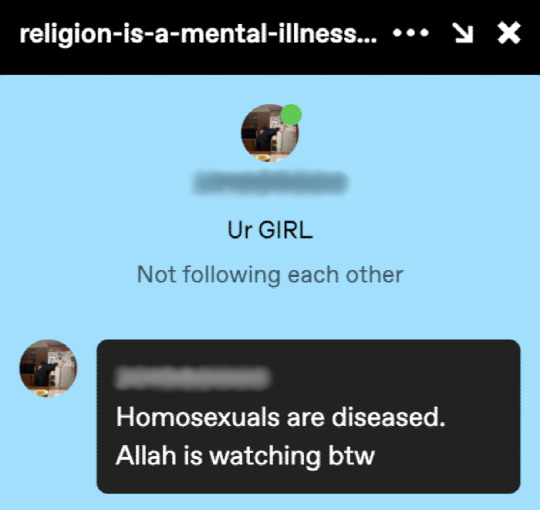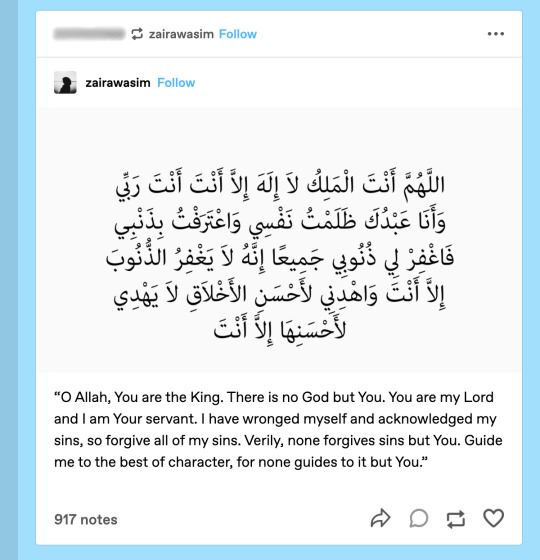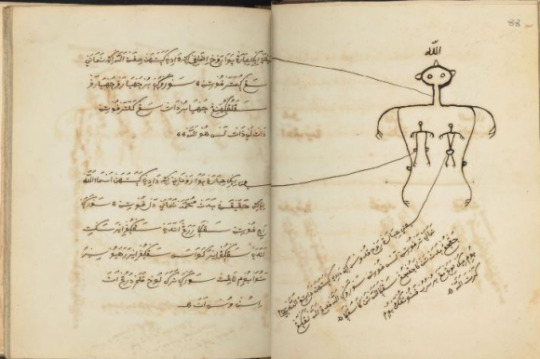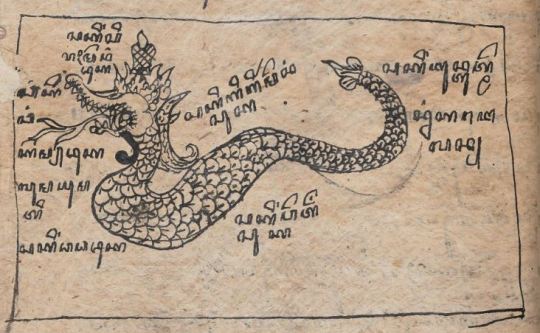#purity of Quran
Photo

I did consider the possibility this was just an insincere troll. But we can see this on her blog.

So, let’s examine the blog of this good Muslim “GIRL”.






So, she’s really obsessed with sex. Exactly as one would expect from someone neck-deep in a regressive purity-culture cult.
I wonder what Islam says about all this.
https://islamqa.info/en/answers/166123/is-watching-porn-haram
Is Watching Porn Haram in Islam?
Watching pornographic websites and sexual activity is haram; it is a disease, not a remedy. The one who does that is afflicted and he should seek to remedy himself by repenting and giving it up, not by making up excuses for himself.
All sinners make up excuses for themselves. The one who drinks alcohol or takes drugs or commits adultery – they all claim that they are under pressure and that they cannot escape it except by doing something haram.
In fact, these haram things only add to their worries and stress. One of the punishments of sin is feelings of stress and alienation, and darkness on the face and in the heart. The further away a person is from his Lord and the more he is indulging in sins, the further away the means of attaining happiness and peace of mind are from him, as Allah, may He be exalted, says (interpretation of the meaning):
“But whosoever turns away from My Reminder (i.e. neither believes in this Quran nor acts on its orders, etc.) verily, for him is a life of hardship.” [Ta-Ha 20:124]
As for the people of faith and obedience, Allah, may He be exalted, says concerning them (interpretation of the meaning):
“Whoever works righteousness, whether male or female, while he (or she) is a true believer (of Islamic Monotheism) verily, to him We will give a good life (in this world with respect, contentment and lawful provision), and We shall pay them certainly a reward in proportion to the best of what they used to do (i.e. Paradise in the Hereafter).” [an-Nahl 16:97]
So, to summarize,
“Watching ... sexual activity is haram.”
https://quranx.com/33.35
For Muslim men and women,- for believing men and women, for devout men and women, for true men and women, for men and women who are patient and constant, for men and women who humble themselves, for men and women who give in Charity, for men and women who fast (and deny themselves), for men and women who guard their chastity, and for men and women who engage much in Allah's praise,- for them has Allah prepared forgiveness and great reward.
https://quranx.com/24.31
And say to the believing women (that) they should lower [of] their gaze and they should guard their chastity, and not (to) display their adornment except what is apparent of it. [..]
https://quranx.com/2.275
Those who consume interest cannot stand [on the Day of Resurrection] except as one stands who is being beaten by Satan into insanity. That is because they say, "Trade is [just] like interest." But Allah has permitted trade and has forbidden interest. So whoever has received an admonition from his Lord and desists may have what is past, and his affair rests with Allah. But whoever returns to [dealing in interest or usury] - those are the companions of the Fire; they will abide eternally therein.
That is, forbidding what Allah has made lawful, or making lawful what Allah has forbidden makes you a non-believer. That is, kufr.
https://quranx.com/5.44
Indeed, We sent down the Torah, in which was guidance and light. The prophets who submitted [to Allah] judged by it for the Jews, as did the rabbis and scholars by that with which they were entrusted of the Scripture of Allah, and they were witnesses thereto. So do not fear the people but fear Me, and do not exchange My verses for a small price. And whoever does not judge by what Allah has revealed - then it is those who are the disbelievers.
That is, judging by any law other than what Allah has sent down makes you a non-believer. Kufr.
She is, by Islamic definition, a disbeliever. An apostate. Kufr. Destined for Jahannam. Sticks and stones, and all that.
Oh. I probably I shouldn’t say “stone,” right?
If there’s anyone who takes Islam less seriously than the moderate Muslim, I’ve never encountered them. The non-Muslim looks at it and goes, yikes, this is all pretty full-on. But the moderate Muslim is both pious and sanctimonious, while also treating Islamic doctrine like a joke.
I mean, I don’t care. Fap yourself silly, till you’re sore and lost track of what day it is. But apparently Allah does.
Allah is watching.
#201000000#islam#haram#kuffar#kafir#kufr#apostasy#religion#Allah is watching#purity culture#read the quran#religion is a mental illness
34 notes
·
View notes
Text






#purity#islam#quran#islamic#muslim#islamicquotes#pakistan#islamic group#muslim community#muslim countries#istanbul#hadith#muslim ummah#allah#jannah#salah#prayer#arabic dua#deen#dua#quran verse
3 notes
·
View notes
Text
May you find what you love exactly as you wished, that delights come to you from where you do not count, may your prayers be answered to the degree that you like, that the doors of all good things will open for you in your walk, may you be reassured a lot, and that fate surprises you with what you love as Allah pleases you. May your heart be filled with joy that nothing can disturb it.
#allah#islamquotes#quran#muslim#words of allah#duaa#islamic reminders#prophet muhammad#tawwakul#forgiveness#happiness#keepsmiling#sunnah#blessings & success#quotes#purity#prayers
22 notes
·
View notes
Text
To the Bloggers who share/reblog ayat from Quran, statements where the Names of Allah are mentioned, name of RasulAllah ﷺ is taken...
and then they share pictures of almost naked women, couples being intimate, reblogs with offensive words...
Shame on you.
Recheck your state of mind and your sanity because it's really abnormal that you're not ashamed to mix filth with purity in such way. And no one should say a word, that no-ones perfect and that kinda rubbish because what you're doing is actually a sin. You're not only lusting over such filth but you're also sharing it. And putting the same on a platform where Islamic texts are shared...?! Seriously?
#this is ridiculous#may Allah save us all from such insanity#muslim tumblr#islam#tumblrpost#unfollow anyone who does this#Don't risk the account of your eyes
66 notes
·
View notes
Text
PARTE 1: In a small town in the south of Spain, there lived a man named Andrés. He was a devout Christian, raised in a deeply religious family. The church had been his refuge since childhood, and his faith had been his guide through the darkest moments of his life. He was involved in all the activities of the parish and was known for his fervent love of God.

Andrés led a quiet and solitary life, dedicated to his work as a history teacher at a local high school. His days were spent between the lessons he taught and the masses he religiously attended. For him, Christianity was not just a religion, but the pillar on which he had built his entire existence.
However, Andrés' routine was interrupted when, one day, he met Karim, a Muslim immigrant who had come to the city looking for a new life. Karim was a charismatic man, with a soft voice and deep eyes. His presence was magnetic, and Andrés was immediately intrigued by him. Karim opened a small tea and spice shop in the neighborhood, and soon began to attract the attention of the locals, not only for the quality of his products, but for his wisdom and serenity.
Andrés, driven by curiosity and an inexplicable desire to know more about Karim, began to visit the shop regularly. At first, their conversations were limited to trivial topics: the weather, politics, cultural differences. However, over time, they began to talk about deeper topics. Karim, although respectful, did not hide his faith. He spoke with a calmness that contrasted with Andrés's fervor, and his words, loaded with meaning and metaphors, began to find a place in Andrés's mind.
One afternoon, while sharing tea, Karim spoke about Islam with a calm passion. He spoke of the prophet Muhammad, of submission to the will of Allah, of the importance of prayer and of the inner peace he found in his faith. Andrés listened attentively, amazed by the depth and beauty of what he heard. It wasn't the first time he had heard about Islam, but something about the way Karim explained it resonated within him in a way he had never experienced before.
Andrés began to doubt. For the first time in his life, he questioned whether his Christian faith, which had been the center of his life, was enough. He was drawn to the purity of Karim's devotion, to the simplicity and peace that seemed to emanate from his being. He didn't know how to reconcile these feelings with his life of Christian devotion. He began to read about Islam, to study the Quran in secret. His visits to Karim's shop became more frequent, and their conversations deeper.
Karim never pressured Andrés. He knew that faith was something that had to spring from within, that it couldn't be imposed. But every conversation they had, every passage of the Quran they discussed, every story about the prophet that Karim told, planted a seed of doubt in Andrés that grew with each passing day.
Finally, Andrew’s internal struggle reached a point of no return. One night, after hours of sleeplessness and prayer, he made the decision to talk to Karim. He confessed his confusion, his internal struggle between the faith he had been raised in and the new truth he had begun to discover. Karim listened in silence, letting Andrew vent all his doubts and fears.
When Andrew finished speaking, Karim simply told him: “The truth cannot be forced. Allah guides whom He wants to guide. If you feel your path changing, follow your heart. But remember, whatever your decision, you must find peace in it.”
That night, Andrew knelt in his room, as he had done so many times before, but this time he did not pray to God as he usually did. Instead, he recited, with a trembling voice, the words he had learned from Karim: “La ilaha illallah, Muhammadur rasulullah.” He did so not out of fear, nor out of coercion, but because deep within him, he felt that he was following the truth he had found.
Andrés left his Christian life behind, not without pain, not without the suffering of losing that which had been his guide for so long. But in his new faith he found a peace he had not known before. Karim became his brother in Islam, and though he never forgot his roots, Andrés knew that he had found his true path.
Andrés’ decision was not easy, and the consequences were not mild. He lost friends, he was misunderstood by many, but he knew that he had followed his truth, a truth that Karim had helped to awaken. And in that truth, Andrés found a new spiritual home, where he could finally rest his soul.
33 notes
·
View notes
Text
The Effects of Sin...
1) Distance from Allah: Sin creates a barrier between a person and Allah, weakening their spiritual connection.
2) Loss of Blessings: It may lead to the loss of rizq and blessings and decrease in goodness in one's life
3) Loss of Morals and Values: Sinning can erode moral values and ethical standards, leading to a decline in personal integrity and societal well-being.
4) Harm to the Soul: Sin damages the purity of the soul & leads to spiritual unrest & guilt
5) Punishment in the Hereafter: Persisting in sin without repentance can lead to punishment in the Hereafter
.
.
.
#islam#islamic#islamicquotes#quran#allah#dua#prayer#salah#sin#alhamdulillah#Jannah#deen#muslim#yarab#fajr#instamuslim#emaan#muslimah#sujood#wordofprophet#quranquotes#friday#tawakkul#tawbah#islamicreminder#sabr#jummah#jannah#islamicquote#islampost
16 notes
·
View notes
Text

And Allah says:
قُل لِّلْمُؤْمِنِينَ يَغُضُّوا۟ مِنْ أَبْصَٰرِهِمْ وَيَحْفَظُوا۟ فُرُوجَهُمْ ذَٰلِكَ أَزْكَىٰ لَهُمْ إِنَّ ٱللَّهَ خَبِيرٌۢ بِمَا يَصْنَعُونَ
Say to the believing men that they should lower their gaze and guard their modesty: that will make for greater purity for them: And Allah is well acquainted with all that they do.
(Al Quran 24:30)
🔐Key takeaways from the verse
Here are the nuggets summarized in straight bullets:
♦️- Lower your gaze to avoid unnecessary looks
♦️- Guard your modesty and chastity
♦️- Achieve spiritual and moral purity through self-control
♦️- Remember Allah is aware of your thoughts and actions
♦️- you shall Be accountable for your choices and behaviors
♦️- Cultivate self-discipline and inner strength
12 notes
·
View notes
Text
ISLAM 101: ETHICS: Part 3
How should the ethics of a Muslim man/woman be?
According to the information obtained from the Quran, every Muslim woman/man has the following characteristics – in summary:
- He believes in Allah and the Day of Judgment. He is careful about the seditions of the world and the tricks of Satan. He worships his Lord, fulfills His order and avoids His prohibitions. He surrenders to Allah fully. He repents a lot and asks his Lord for forgiveness due to his mistakes, negligence, and sins.
- He is aware of his responsibility toward his family members. He seeks Allah’s consent in everything that he does. He orders what is good as much as he can and forbids what is evil.
- He is aware of his duties toward himself. He is aware that man consists of mind, spirit, and body and that each has a structure and needs peculiar to them. He is careful about the balance among them; he does not give one too much importance by ignoring the others. He regards the Book of Allah, the Sunnah of the Prophet and the lives of great personalities as a guide regarding the issue.
- He gives importance to his clothes without waste, extremism, and conceit. He shows the care that fits man, whom Allah made honorable, ordered His angels to prostrate and put what is in the skies and earth under his service, in his inner world.
- He treats his parents well and does them favors. He appreciates them. He tries not to be a disobedient child.
- He becomes mature, loving and friendly toward his spouse; he tries to attain her consent; he tries to show respect to her, do her favors, keeps her secrets, helps her do favors act piously and do righteous deeds; he fills her with happiness and peace.
- She is a very compassionate mother toward her children. She is aware of her responsibility for their education. She makes her children feel her love, compassion, and mercy toward them. When it is necessary, she warns her children and corrects their mistakes. Thus, she makes high ethics settle in their hearts; she tries to give them a good education by directing them to good and honorable works.
- He continues the bond of love between him and his relatives. He does his neighbor's favors and helps them. He takes care of them. He knows the rights of neighbors and observes them.
His relationship with his brothers and friends are based on “loving for Allah”. It is the loftiest and cleanest love in human life. For, it is a love that is free from all kinds of material interests and doubts. A relationship based on this principle takes its cleanliness and purity from the light of the Quran and the Sunnah.
Therefore, a Muslim is honest, sincere and tolerant in his relationships with his brothers. He does not break off his relationship with them; he does not hurt their feelings by arguing and quarreling with them. He does them favors whenever he can. He always welcomes them by smiling. His social relationships are at a very high level. He takes his socialness from the principles of his religion and the decrees about high ethics of the fiqh of mutual relationships.
In addition, every Muslim, man-woman, has the following characteristics:
- He has high ethics. He tells the truth to everybody and is honest.
- He does not trick, deceive or betray people. He does not perjure.
- He gives advice. He leads people to good deeds. He keep his promise. He is modest and chaste.
- He does not interfere in the things that do not interest him. He does not search for people’s private issues.
- He keeps away from showing off. He acts justly in all cases. He does not oppress. He acts justly toward the people that he does not like. He does not become happy for the bad things that happen to anybody.
- He does not have negative thoughts about others. He does not backbite or commit talebearing. He does not swear and utter bad words. He does not mock anybody.
- He is lenient and merciful toward people. He helps those who are in need. He is generous. He does not run anybody’s nose in it. He makes things easy, not difficult.
- He does not act jealously. He avoids fictitious words and deeds. He is good-humored. He does not act arrogantly; he is humble. He is not engaged in useless things.
- He visits ill people. He cares about the problems of others. He prefers others to himself. He appreciates the favors done to him and thanks people.
- She adapts her customs and traditions to Islamic criteria. She shows respect to the elderly and virtuous people. She does not try to resemble men.
- She calls to Allah. She calls people kindly and wisely. She stays together with righteous women.
- She is chaste and modest; she protects her awrah places. She protects not only her body, eyes, and ears but also her mind, heart, and intention from all kinds of haram deeds.
- She is patient and hopeful. She never abandons hope of Allah’s mercy.
- She is knowledgeable about religion and ilm. She learns what is useful and harmful for her and acts accordingly.
- She is solemn and respectful.
- She is natural; she appears as she is and she is as she appears.
He never falters and acts lazily in important and dangerous duties. He relies on Allah.
- He gives importance to bodily and spiritual cleanliness and acts accordingly.
- He is not a gambler, drunkard, trickster, fraud, cheater, sycophant and twister.
- He does not judge about something that he does not know.
- He never leaves the truth and justice anywhere even if it is against him.
- He never leaves justice related to his enemies; he does not obstruct justice due to his enmity toward them.
- He avoids extravagance and stinginess.
- He does not harm anybody with his hand or tongue.
- He helps others at times of both welfare and hardship.
- If he wants to commit a bad deed or wrong somebody, he remembers Allah at once, asks forgiveness from Him and repents.
- He accepts the truth no matter who tells it; he accepts and takes knowledge, skill, wisdom, and truth wherever he finds them; he does not act bigotedly about them.
- He is not lazy. He works for the world as if he will never die and gets ready for the hereafter as if he will die tomorrow; he fulfills his duties about both of them fully.
- He regards the love of Allah and the Prophet superior to everything. Love and fear of Allah cover all of his body.
- He avoids doubtful things by all means.
- His biggest aim is to try to be a real Muslim, to practice and make others practice the virtues that Islam determines and suggests, and to serve as a model to everybody.
Those are some examples from the personality of a Muslim, whom Islam forms with guidance, whose heart Islam forms with wisdom and whose prudence Islam enlightens.
#Allah#god#islam#quran#muslim#revert#revert islam#convert#convert islam#converthelp#revert help#reverthelp#revert help team#help#islam help#salah#dua#prayer#pray#reminder#religion#mohammad#muslimah#hijab#new muslim#new revert#new convert#how to convert to islam#convert to islam#welcome to islam
10 notes
·
View notes
Text
One can draw near to Allah ﷻ by applying ten principles:
1. Repenting from all things unlawful and offensive.
2. Seeking sacred knowledge in the amount needed.
3. Continually keeping ritual purity.
4. Performing the prescribed prayers at the first of their times in a group prayer and performing the confirmed sunnis associated with them.
5. Always performing eight raka’ahs of the non-obligatory duha prayer (the mid-morning prayer).
6. The six raqqa’s between sunset and nightfall the night vigil prayer after rising from sleep Tahajjud and the witr prayer as the last prayer before dawn.
7. Fasting Mondays and Thursdays in the full moon days the 13th 14th and 15th of the month.
8. Reciting the Quran with the presence of heart with the with pre presence of heart on the meanings.
9. Asking much of allah’s forgiveness in so far
10.Always invoking the blessings upon the prophet pbuh.
35 notes
·
View notes
Text

Allah calls Himself Al-Quddoos— The Most Pure, The All-Perfect— on two occasions in the Quran. He is the One who is the absolutely pure in essence and attributes. Al-Quddoos is free from and far above any worldly imperfection, and He is beyond all human understanding of purity and perfection!
The Most Pure, the All-Perfect
Quddoos comes from the root qaaf-daal-seen, which points to three main meanings. The first main meaning is to be pure and clean. The second is to be far removed from impurity or imperfection, and the third main meaning is to be sacred or blessed.
This root appears ten times in the Quran in five derived forms. Examples of these forms are al-qudusi (“the Holy [spirit]”) and al-muqadasi (“the sacred”).
Linguistically, quddoos is on the intense structure of the attribute of quds, which refers to cleanliness or tahaarah and comes from the verb qadasa. Al-Quddoos is ‘clean’ or free from any partner, spouse, or child, from death, from injustice, lying, forgetfulness, error, poverty, and stinginess. Laa ilaaha illa huwa– there is no God but He.
Al-Quddoos Himself says: He is Allah , other than whom there is no deity, the Sovereign, the Pure . . . [Quran, 59:23] Whatever is in the heavens and whatever is on the earth is exalting Allah, the Sovereign, the Pure, the Exalted in Might, the Wise. [Quran, 62:1]
Subhanallah and alhamdulillah
They said, ‘Will You place upon it one who causes corruption therein and sheds blood, while we declare Your praise and sanctify You?’ [Quran, 2:30]. The angels glorify and praise Allah al-Quddoos continuously and so does the whole universe. Al-Quddoos created us human beings to worship, glorify, and praise Him as He gave us something different: our hearts.
Using the human heart to reflect on His creations, His perfection and greatness, it realizes that glorification and praise of the Creator is inevitable. So we praise and thank Al-Quddoos (alhamdulillah) and glorify Him (subhanAllah) as He is high above anything that does not befit Him. Isn’t it a blessing to have such a perfect lord, and aren’t we blessed to be able to praise Him?
How can you live by this name?
1.Have a pure belief in Al-Quddoos.
Believe in the oneness of Al-Quddoos and make sure your creed (or aqeedah) is pure by studying the types of tawheed and their practical meanings in your daily life from trustworthy sources, like Kitaab ut -Tawheed (The Book of Tawheed) by ibn Abd Al-Wahhab.
2. Praise Al-Quddoos.
Say alhamdulilah and subhanAllah from the bottom of your heart. The Prophet salallahu ‘alayhi wa sallam used to say in his prayer while in the bowing position (ruku): subboohun quddoosun Rabbul-malaa’ikati war-rooh (praise and Holiness be to You, Lord of the angels and the Soul). [Muslim] You can add this beautiful invocation to enhance your prayer.
3. Purify yourself through prayer.
The Prophet salallahu ‘alayhi wa sallam asked the companions: If someone bathes in a river outside of his house five times a day, will there be any impurity left on him? [Muslim] Visualize your prayer as cleansing your body and soul. Your prayer also protects you: indeed the prayer prevents from the indecency and evil. [Quran, 29:45]
4. Give the best sadaqah.
Give zakah (obligatory) and sadaqah (charity) to “purify” and increase your wealth. Take, [O, Muhammad], from their wealth a charity by which you purify them and cause them increase. [Quran 9:103] Remind yourself when you give sadaqah to give the best, as Allah is Al-Quddoos and He deserves the best to be given for His sake. Aishah radiyalahu anha used to perfume the charity she gave!
5. Don’t be unjust.
Allah does not wrong a person even to the amount of an atom’s weight [Quran 4:40]. Even if people do dhulm (injustice) to Him, Al-Quddoos never does injustice to people. Allah ‘azza wa jall also made injustice and oppression forbidden for you; so don’t be unjust to anyone, family or stranger, child, adult or even to animals.
6. Be clean.
Be clean inside and out and strive to purify and keep renewing your intentions when you do a good deed. Be thoughtful with your wudu; do your best to not only keep your belongings and house clean, but also your environment by not throwing litter and by removing harmful objects. Consume healthy and permissable food and drink— bought with halaal earnings— and teach children this way of living.
7. Let the Quran purify you.
And who is more truthful than Allah in speech? [Quran, 4:122] The speech of Al-Quddoos is pure and is a cure, healing, and guidance for you to purify yourself. So turn to the Quran to seek cure from the diseases of your heart, let the ayaat help you to improve your character, and recite the Quran daily to clean your heart and bring tranquillity to your body.
8. Ask Al-Quddoos.
The Prophet salallahu’ alayhi wa sallam used to ask Al-Quddoos at the beginning of prayer:
اللهم باعد بيني وبين خطاياي كما باعدت بين المشرق والمغرب اللهم نقني من خطاياي كما ينقى الثوب الأبيض من الدنس اللهم اغسلني من خطاياي بالثلج والماء والب
O Allah, distance me from my sins just as You have distanced The East from The West, O Allah, purify me of my sins as a white robe is purified of filth, O Allah, cleanse me of my sins with snow, water, and ice. [Al-Bukharee, Muslim] Use and reflect on this supplication as it contains all forms of purification: distancing (moving far away from dirt and deficiencies), removing dirt or filth, and washing or cleansing, so no impurity remains at the end.
O Allah, Al-Quddoos, we know that You are the absolutely pure beyond imagination. Lead us to a sound belief in Your oneness, help us in purifying our hearts, deeds, and intentions, and guide us to purify our bodies and keep our environment clean. Aid us in performing the best salah, giving the best charity, and helping us to turn to the Quran so we can come to You with a pure heart, ameen!
#allah#islam#revert help team#asma al husna#revert help#muslim#ayat#daily#allah’s name#dua#pray#prayer#salah#muslimah#hijab#religion#reminder#mohammed#new revert#new convert#how to convert islam#converthelp#convert islam#become a muslim#welcome to islam#prophet#god#revert#daily ayat#reverthelp
10 notes
·
View notes
Note
I was wondering if you ever had days when your heart feel closed and that you are committing sins and you are aware of it and somehow .... its so normalised that you can't repent and when you do you sin over and over... I feel as of there is a barrier between Allah and me and I feeling the verse of yhe Quran that once said " that their hearts grew hard as the stones"... do you know of a wag to help me overcome that... like a book , a short video or something ...
It’s completely normal to experience days when your heart feels closed and the weight of repeated sins seems overwhelming. No muslim is perfect. Our Imaan fluctuates all the time.
Sins are like shackles that prevent your from obeying Allah as befits Him جل جلاله
Shaytaan enters from the weakest points in our Imaan. Shaytaan keeps telling us that we are not worthy of Allah’s love due to our sins. And convinces us that we are far from being pious so we don’t have to try any harder to perform Ibadah.
Shaytaan creates all these illusions, so you must not let it in, and shield yourself with Allah’s love, and that’s where your strength will be revived.
Allah says:
"Say, 'O My servants who have harmed yourselves by your own selves, do not despair of Allah's mercy. Allah forgives all sins. He is truly the Forgiving, the Merciful.'" (Surah Az-Zumar, 39:53).
I hope this Ayah could provide comfort and hope. It reminds us that no matter how many sins we have committed, Allah’s mercy is greater and encompasses all. It encourages us to turn to Him with hope and trust in His boundless forgiveness. This loneliness you’d feel when you sin, is a reminder that you need your true solace.. Allah.
The Prophet Muhammad (peace be upon him) said:
"The one who repents from sin is like the one who has no sin." (Ibn Majah)
This hadith reassures you of the boundless mercy of Allah. No matter how many times we sin, true repentance can erase those sins and restore us to a state of purity. Keep your tongue busy with Istighfar, and remember that no muslim is perfect, we all have our ups and downs, and remember that Allah loves when His servant repents, no matter how many times you sin, Allah still loves it when you ask for forgiveness.
For further guidance and deeper understanding of the heart’s purification and the process of repentance, I recommend reading “Al-Da’a wa Al-Dawa’a" by Ibn Al-Qayyim. This book provides profound insights into overcoming spiritual barriers and fostering a stronger connection with Allah.
The one thing you should not do, is to despair of Allah’s mercy.. He is The All-Merciful.
8 notes
·
View notes
Text
How to make Allah satisfied?
Here's a list of 7 things that make Allah swt happy:
ZHIKR: Hearts find rest in remembrance.
SALAH: Show gratitude by worshipping.
ISTIGHFAR: Repent & strive to be better.
DUA: Talk to Allah, make Him your friend.
HALAL: Eat & earn halal, purity.
QURAN: Recite or listen.
CHARACTER: Be kind to His creation.
#islam#quran#islamic#muslim#islamicquotes#pakistan#islamic group#muslim community#muslim countries#istanbul#islamicpost#islamicreminder#hadith#muslim ummah#makkah#allah#muslimah#jannah#alhamdulillah#instagram
149 notes
·
View notes
Text
Surah Ikhlas and Surah Al-kafirun are sometimes together known as " Ikhlaseen "
( meaning two surah of sincerity)
Prophet pbuh recited Surah al-Kafirun and Surah al-Ikhlas in the two rakats (units) of Prayer before the obligatory Prayers of Fajr (Morning) Prayers, and in the two units of Prayer following the obligatory Prayers of Maghrib (Evening) Prayers, and that these two surahs were called the purity of faith.
So u should also do accordingly in your prayers ( i.e reading Surah Ikhlas and Surah Kafirun).
Surat al-Ikhlas is equivalent to one-third of the Quran. Al-Bukhari (6643 )
#quranquotes#islam#islamdaily#quranandsunnah#islam help#islamislove#islamic#al quran#islamicpost#convert to islam
9 notes
·
View notes
Text
Tl;Dr - Primbon is like a type of "Zodiac System" for the Javanese where we use nature, astrology etc as a tool for divination, cleansing, etc.
----
I want to ramble a little about Indonesia's old spirituality, mythicisms and beliefs!!
I'm not entirely religious but ever since I practice Tarot, I have this belief of souls and spirit guardians in divination, and the more I practice divination the more I feel rooted into our culture's old beliefs.
Anyway, this has nothing to do with that... kinda.
Here in Java, we have this old manuscript called Primbon Palintangan Palindon Pakedutan, it contained texts on physiognomy and astrology, as well as other subjects.

In this age, to believe in Primbon can be seen as Syirik and could lead to blasphemy.
According to KBBI, Primbon is defined as a Book consisting of forecast, knowledge of kejawen, occultism, a peculiar numeric system for calculating lucky days, prayers, selections from the Qur’an, instructions relating to ritual purity and performance of obligatory worship, texts on mysticism, astronomy, astrology, and every other important matter.
This book is mainly oriented towards the relationship between mankind and nature and is used as a life guide for Javanese people. Jogja also have their own Primbon called Bataljemur Adammakna!

Primbon uses the Javanese calendar where every day, month, and year has its own calculation and is used to identify events that could occur in the future. It could be used as divination and a tool to hone vigilance.
There are eleven teachings;
Pranata reads the universe and petungan are the numbers that reads your fate
Pawukon calculates time and dates
Perobatan, where medicinal Primbon filled with prayers, spells and spiritual intentions are inscribed into a piece of paper and then burnt. Its ashes can then be rubbed on an affected area to heal.
Wirid are messages, suggestions, or prohibitions that are considered necessary to be followed for the sake of creating harmony
Aji-aji reflects the supernatural side of Javanese life. It is believed that extraordinary supernatural powers are contained in a spell if it is truly believed.
Kidung is a song and / or poetry that contains advice and such.
Ramalan means Divination, it is self explanatory...
Kawilujengan contains guidelines about the implementation of Javanese rituals for various purposes.
Donga is similar to Aji-aji but uses the verses from the Quran and spelled in Javanese
Finally, Ngalamat or sasmita is usually a strange phenomenon in the universe that is considered an oddity. The phenomenon is then interpreted as a sign of something.
Basically, Primbon is like zodiac systems and common astrology for us!!! Also the Brits took six volumes in 1812!!!!!! Give it back along with our legendary Keris!!!!!!! Please :(
27 notes
·
View notes
Text

Gambia Moves Toward Overturning Landmark Ban on Female Genital Cutting (Ruth Maclean, The New York Times, March 18 2024)
"Human rights experts, lawyers and women’s and girls’ rights campaigners say that overturning the ban would undo decades of work to end female genital cutting, a centuries-old ritual tied up in ideas of sexual purity, obedience and control.
If the bill passes the final stages, the small West African nation of Gambia will become the first nation globally to roll back protections against cutting. (…)
“It was very sad to witness the whole debate, and men trying to justify why this would continue,” Ms. Baldeh said after the vote.
She said she feared that if the men leading the charge — whom she described as extremists — succeeded, they would next try to roll back other laws, like one banning child marriage.
Inside Parliament, lawmakers — all of them men — traded arguments.
“If people are being arrested for practicing F.G.M., then that means they are being deprived of their right to practice religion,” one member of parliament, Lamin Ceesay, said, according to Parliament Watch, a project that promotes parliamentary transparency and accountability.
“Let’s protect our women,” another, Gibbi Mballow, said. “I am a father, and I can’t support such a bill.” He added, “Religion says we should not harm women.”
Cutting takes different forms and is most common in Africa, though it is also widespread in parts of Asia and the Middle East.
Internationally recognized as a gross violation of human rights, it frequently leads to serious health issues, like infections, hemorrhages and severe pain, and it is a leading cause of death in the countries where it is practiced.
Worldwide, genital cutting is increasing despite campaigns to stop it — mainly because of population growth in the countries where it is common.
More than 230 million women and girls have undergone it, according to UNICEF — an increase of 30 million people since the last time the agency made an estimate, in 2016. (…)
Clerics in the Muslim world disagree on whether cutting is Islamic, but it is not in the Quran.
The most vocal of the Gambian imams, Abdoulie Fatty, has argued that “circumcision makes you cleaner” and has said the husbands of women who have not been cut suffer because they cannot meet their wives’ sexual appetites."
15 notes
·
View notes
Text
the “Islam is oppressive towards women because period blood is impure” argument will never not send me to the floor.
jaan. sit down.
The first thing you need to know is that in Islam, coming into contact with human waste makes you impure— not as in gross, impure as in you must perform Wudu, the ritual of washing your body with clean water, before performing any religious practice. When you have performed Wudu, you are in a state of purity and can pray, touch the Quran, fast, perform Umrah/Hajj, you name it.
Some things nullify your Wudu, making you impure again. You cannot perform any of the aforementioned religious practices until you re-enter a state of purity, by performing Wudu once more. You cannot even enter a masjid until you are pure again.
There are different ways that your state of purity becomes void. Indeed, one such way is that you come into contact with human waste. This includes piss, crap, and of course, period blood, or the shed lining of the uterus.
Do not come at me with “sweating and exhaling carbon dioxide count as producing waste” I will block you. Those are not included for obvious reasons. Sweat, let alone one’s breath, is not considered on the same level of impure as urine or feces. This is common sense.
Period blood does make you impure. Just like how peeing makes you impure, pooping makes you impure. Did you know that even farting will nullify your Wudu? How about sleeping?
(The logic behind the sleeping one is that you may not necessarily have released waste or passed gas in your sleep, but you don’t know for sure, so there is always a chance that you have. It is best to play it safe and assume you are impure after sleeping and perform Wudu again.)
Period blood is the same kind of impurity as pee or poop. It’s natural, but it is still impure. You’re not allowed to perform any religious practice after coming into contact with these until you have made Wudu. It’s that simple. Women are not inherently impure, but urinating and defecating will make anyone impure. Period blood is merely an additional waste product women have to look out for.
The only difference is that when a woman is on her period, for those few consecutive days, she will be in a constant state of impurity. This is because shedding the uterine lining is a constant process that takes multiple days. So even if we perform Wudu, our period will continue to flow until the uterus is done shedding its lining. So for those few days, we simply avoid praying, fasting, touching the Quran, going to the masjid, or any other religious practice.
Yes, this is the major reason. Another reason women cannot perform religious acts is because Allah (SWT) wants to make His religion easy for His followers. He (SWT) knows His creation best, which is why He mandates this time off of prayers and fasting for women. We are often in pain during periods, and in Islam you are not obligated to perform anything that puts a strain on you or can hurt you physically.
There is no obligation on women to compensate for any prayers they miss while on their period. For Ramadan, we are given the option to make up the days of fasting that we miss after Ramadan is over. If I remember correctly, the only deadline is the beginning of the next Ramadan. (I may be incorrect about this, though, so if anyone has a definite answer I would appreciate being educated.) This further illustrates how Allah’s wisdom makes His faith easier on women, because of the unique challenges we face.
Lastly, periods are not a taboo subject in Islam. We are encouraged to pursue science and learn more about ourselves and our world, why would discussing periods be taboo? That is an unfortunate cultural norm that Muslims in many countries have confused with their Islamic beliefs. Discussing periods would be the same as discussing one’s digestive or excretory health. Obviously there are times when it’s not appropriate, but it must not be avoided.
Again, it’s just waste. It’s nothing to be afraid of. Islam does not teach humans, especially women, to be afraid of talking about our bodily functions. Certain countries’ cultures do.
It is absolutely haraam to declare something is haraam or forbidden in Islam when it is not. But Christians in the West don’t get the same flack for not following their religion perfectly that Muslims do.
thanks for attending my lecture! as always, don’t forget to eat your greens! from the river to the sea, Palestine will be free.
#lightgriffinsect express#islam#muslim#periods#muslim women#being muslim#islamic life#muslim life#women in islam#women’s health#period health#women are not required to even shave our arm or leg hair#that is a western norm that Muslims in some countries have adopted.#human waste is not the only thing that makes you impure btw! there are other factors I didn’t mention bc they weren’t relevant#but vomiting and having sex also make you impure#vomit and semen are impure substances that one must make Wudu after touching#important
16 notes
·
View notes